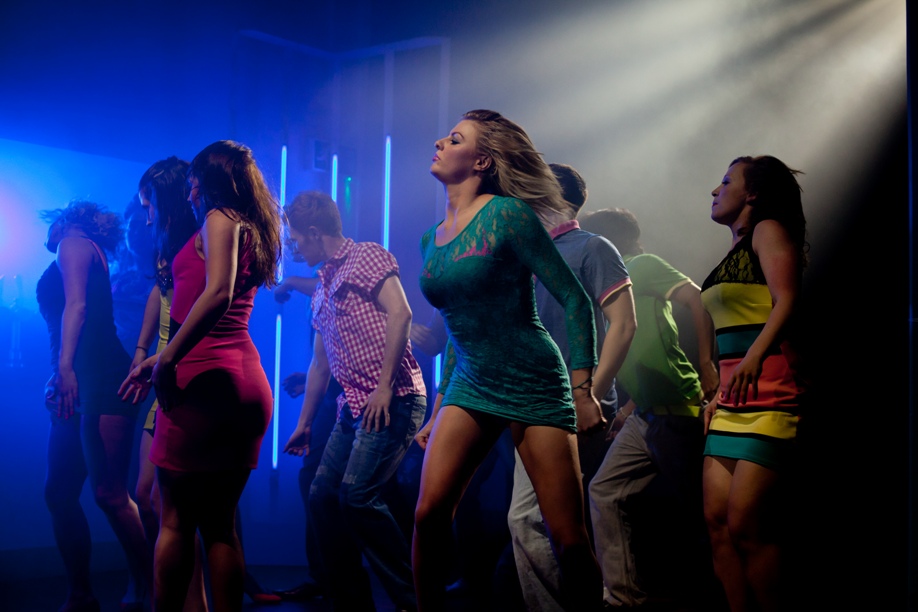Ever since the Polish photographer Maciej Dakowicz documented the debauchery of South Wales nightlife in a series called Cardiff at Night, there has been a kind of perverse glamour in images of scantily clad girls and young women falling down drunk whilst roaming gangs of check-shirted “roiders” look on gormlessly. Being as Swansea’s nightlife is, as depicted here, even “scruttier” – to use the evocative local parlance (think “slut” meets “scrubber” and you’ve got it) – than that of the capital, an artistic documentation of Swansea at Night was inevitable at some point. The surprise is in the form it takes: Frantic Assembly, formed in the city in 1994, have a history of producing physical works combining music and movement, text and design, and this collaboration with National Theatre Wales is loosely based on a Dylan Thomas short story.
The first scene of this fast-moving promenade performance takes place in a mid-twentieth-century genteel living room of the type the town’s most famous son would have been intimately familiar. But the set is soon stripped down to reveal a backdrop of a peeling billboard, a smashed-up car, piles of bin bags. A gang of hooded youths perform energetic contemporary dance to the throb of club music (pictured below). Dylan Thomas would recognise the drunkenness, sex obsession and formlessness that informs these characters’ lives, but Frantic Assembly’s dynamic, physical theatre bears as little direct resemblance to the source material as do the lives of Swansea’s older denizens to those of their grandchildren.
 This generation gap is central to the piece. We are presented with a series of tableaux representing the lives of Swansea youth, without recourse to sentiment. One particularly memorable scene centred on a row of toilet cubicles in a city centre nightclub; we are “treated” to a Technicolor display of fornicating, defecating and regurgitating, clothes-swapping and partner-swapping to make even the most liberal-minded members of the audience question the moral compass of the younger generation and the nation which not only lets them get away with such behaviour but in so many ways actively encourages it.
This generation gap is central to the piece. We are presented with a series of tableaux representing the lives of Swansea youth, without recourse to sentiment. One particularly memorable scene centred on a row of toilet cubicles in a city centre nightclub; we are “treated” to a Technicolor display of fornicating, defecating and regurgitating, clothes-swapping and partner-swapping to make even the most liberal-minded members of the audience question the moral compass of the younger generation and the nation which not only lets them get away with such behaviour but in so many ways actively encourages it.
And this is the rub, for me (for most of the characters, the “rub” involves genitalia). In presenting the lives of a generation of mixed-up teenagers with a cast of twentysomethings and in such an unflinching way, Little Dogs casts a whole generation in a negative light. Siân Phillips, whose grandmotherly figure presides over many of the scenes with a benign but saddened presence, gives a wonderfully strident monologue as the play’s finale. But the most touching scene is when she comforts a lonely boy at a bus stop (Darren Evans, pictured overleaf with Siân Phillips), singing with him a lullaby long forgotten. We are not encouraged to celebrate or condemn these characters, this generation; we are required to sympathise. Given that the devised nature of the piece leaves us with a lack of depth to the script – we only know one aspect of their existence – it seems to me a patronising response.
 Little Dogs works wonderfully as art installation: Tim Dickel’s sets are powerfully imbued with symbolic depth, and the way we are shunted back and forth across the historic floor of the Patti Pavilion is reminiscent of how we might approach an open-plan gallery. It is also full of pulsating music, energetic dance and movement and some highly memorable vignettes. I’ll never forget Jordan Bernarde removing the knickers of so many past conquests out of his own clothes, but tellingly this moment loses rather than gains power when it is reprised with teddy bears and a repeat of the same speech in a different tone.
Little Dogs works wonderfully as art installation: Tim Dickel’s sets are powerfully imbued with symbolic depth, and the way we are shunted back and forth across the historic floor of the Patti Pavilion is reminiscent of how we might approach an open-plan gallery. It is also full of pulsating music, energetic dance and movement and some highly memorable vignettes. I’ll never forget Jordan Bernarde removing the knickers of so many past conquests out of his own clothes, but tellingly this moment loses rather than gains power when it is reprised with teddy bears and a repeat of the same speech in a different tone.
The writing is not bad, it is average – and this is its undoing. Set against such music, movement and a stunning visual panorama, this feast for the senses is let down slightly not by its lack of narrative – for the lives it describes similarly lack shape, structure and meaning – but by a failure of its words to strike at the heart in the same way as its audio-visual urgency. In this triumph of style over substance, perhaps, one might conclude the company have inadvertently stumbled on something profound about the generation they portray. But there is more to young people than falling down drunk. Isn’t there?
- Little Dogs at Patti Pavilion, Swansea until 19 May















Add comment